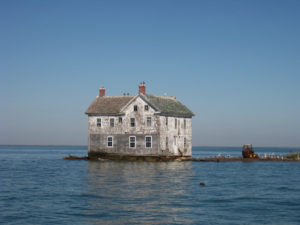No Man Is an Island—but Our Species Is Sinking Lots of Them
 An abandoned house on Holland Island, near Tangier Island, in the Chesapeake Bay. Photo by baldeaglebluff via Flickr.
An abandoned house on Holland Island, near Tangier Island, in the Chesapeake Bay. Photo by baldeaglebluff via Flickr. “Your island has been there for hundreds of years, and I believe your island will be there for hundreds more,” President Trump recently told the mayor of Virginia’s Tangier Island in response to reports that the Island is losing fifteen feet of land each year to rising sea levels. Trump’s “don’t worry, be happy” assurance to Mayor James Eskridge contradicts the messages of scientists in the US Army Corps of Engineers, whose research shows that all 700 residents will need to abandon the island within the next fifty years. “Climate change is upon us,” the report warns, “and that adaption to climate change is ‘not optional.’”
So far the Trump presidency has offered quite a few of these vague and false assurances that completely ignore scientists and their decades of research. And Mayor Eskridge, like many others, believes the president. Despite recognizing that his small island in the Chesapeake Bay is “running out of land to give up,” he does not consider climate change to be the cause. “Like the president, I’m not concerned about sea level rise,” he said. “I’m on the water daily, and I just don’t see it.”
This denial and the repercussions of inaction are alarming. The Army Corps of Engineers concluded its study by warning: “The Tangier Islands and the town are running out of time, and if no action is taken, the citizens of Tangier may become the first climate change refugees in the continental USA.”
The conflict over the validity of climate change exists not only in politics, but in our schools as well. A new survey published by the National Center for Science Education (NCSE) captures the disconnect between scientists and educators. It reveals that most teachers present climate change as an ongoing debate, rather than fact—if they discuss it at all. Furthermore, it finds that only a small number of teachers have taken even a single college course on climate science. Other surveys have discovered that teachers oftentimes possess misconceptions on the subject, and all surveys suggest that providing teachers with recurrent professional development opportunities and support would increase their interest and comfort level for teaching climate change to their students. Benjamin Herman, assistant professor in the Department of Learning, Teaching, and Curriculum at the University of Missouri College of Education said in a press release: “Because of existing misconceptions and misinformation regarding climate change, science teachers have a crucial professional and ethical responsibility to accurately convey to their students how climate change is studied and why scientists believe the climate is changing.”
But religious pushback and momentum from individuals like Education Secretary Betsy DeVos, who favors private religious schools over public schools, adds to the problem. For example, CNN reports that a bill in the Texas House of Representatives would allow science teachers to discuss the strengths and weaknesses of existing scientific theories, namely climate change, evolution, and the origins of life, rather than teach them as fact. Supporters of the bill argue that in order for educators to be effective, their academic freedom must be protected. However, to call the dissemination of proven falsities in public institutions academic freedom is absurd.
Although Trump has been clear that he believes climate change is a hoax, we cannot ignore the effects of climate change happening right now. Just last week the science team of a Canadian research icebreaker, the CCGS Amundsen, announced that they were forced to cancel their study monitoring the impacts of climate change and resource development in the Arctic. The reason? Climate-related changes in Arctic sea ice created hazardous conditions that threatened the safety of the researchers. And a recent study revealed that the planet is warming twenty times faster than Earth’s fastest non-human-induced climate change. Over the past forty years alone, global warming has occurred three times faster than the fastest climate change on record. And this number is only expected to increase. In other words, the island of Tangier (and those like it) are running out of time.
Our future, and the future of all life on this planet as we know it, is dependent upon our understanding of climate change. In order to address popular misconceptions and the rejection of climate change, to address issues of food insecurity, and to avoid losing communities like Tangier Island, we must commit to opening a dialogue and acting to mitigate the effects of our changing climate.
